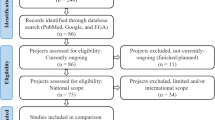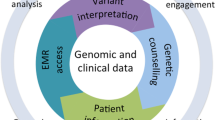Abstract
With increased technological sophistication and rapidly reducing costs, currently, a huge amount of personal and population-level human genomic data and information is generated globally. There is an urgent need for an adequately curated and annotated human genome variant database for successful and large-scale application and translation in biomedical research, medical (healthcare) applications, socio-economic benefits and many other applications. The bulk of the available genomic data is generated from peoples of European descent. The genome data, particularly the human genome variant data is skewed with minimal content from other populations, particularly the minority or diverse populations. It has further contributed to global health inequality, which is visible in inefficiency, lack of effectiveness and disparity in clinical diagnosis, and precision-personalized medicine and preventive healthcare. Inevitably, this gap is widened with ensuing socio-economic implications. This problem is now faced by medical practitioners and healthcare providers in India, South Asia and other low and middle-income countries (LMICs). The current review provides views and critical appraisal of the current status of genomic research, clinical utility and genome variant databases in India and South Asia. A few observations and recommendations are made to ensure harmonization that requires further structured audit and appraisal by the indigenous populations’ consortium. Emphasis is made on the urgent need for statutory regulation of genome data generation, storage, and retrieval systems in research and diagnostic genomic laboratories.

Similar content being viewed by others
References
Aggarwal S. and Phadke S. R. 2015 Medical genetics and genomic medicine in India: current status and opportunities ahead. Mol. Genet. Genomic Med. 3, 160–171.
Amberger J. S., Bocchini C. A., Scott A. F. and Hamosh A. 2019 OMIM.org: leveraging knowledge across phenotype-gene relationships. Nucleic Acids Res. 47, D1038–D1043.
Barnett S., Huckvale K., Christensen H., Venkatesh S., Mouzakis K. and Vasa R. 2019 Intelligent sensing to inform and learn (InSTIL): a scalable and governance-aware platform for universal, smartphone-based digital phenotyping for research and clinical applications. J. Med. Internet. Res. 21, e16399.
Caron N. R., Chongo M., Hudson M., Arbour L., Wasserman W. W., Robertson S., Correard S. and Wilcox P. 2020 Indigenous Genomic Databases: Pragmatic Considerations and Cultural Contexts. Front. Public Health 8, 111.
Caulfield T. and McGuire A. L. 2012 Direct-to-consumer genetic testing: perceptions, problems, and policy responses. Annu. Rev. Med. 63, 23–33.
Comfort S., Perera S., Hudson Z., Dorrell D., Meireis S., Nagarajan M., Ramakrishnan C. and Fine J. 2018 Sorting through the safety data haystack: using machine learning to identify individual case safety reports in social-digital media. Drug Saf. 41, 579–590.
Consortium G. K 2019 The GenomeAsia 100K Project enables genetic discoveries across Asia. Nature 576, 106–111.
Cooper G. M. 2015 Parlez-vous VUS? Genome Res. 25, 1423–1426.
Dissanayake V. H., Scaria V., Samarakoon P. and Patowary A. 2011 The Sri Lankan personal genome project. Sri Lanka J. Bio-Med. Infor. 2, 4–8.
Euesden J., Lewis C. M. and O’Reilly P. F. 2015 PRSice: polygenic risk score software. Bioinformatics 31, 1466–1468.
Huckvale K., Venkatesh S. and Christensen H. 2019 Toward clinical digital phenotyping: a timely opportunity to consider purpose, quality, and safety. NPJ Digit. Med. 2, 88.
Hudson M., Garrison N. A., Sterling R., Caron N. R., Fox K., Yracheta J. et al. 2020 Rights, interests and expectations: Indigenous perspectives on unrestricted access to genomic data. Nat. Rev. Genet. 21, 377–384.
Ju D., Hui D., Hammond D. A., Wonkam A. and Tishkoff S. A. 2022 Importance of including non-European populations in large human genetic studies to enhance precision medicine. Annu. Rev. Biomed. Data Sci. 5, 321–339.
Krapohl E., Patel H., Newhouse S., Curtis C. J., von Stumm S., Dale P. S. et al. 2018 Multi-polygenic score approach to trait prediction. Mol. Psychiatry 23, 1368–1374.
Kumar D. 2022 The emergence of clinical genomics and genomic medicine across India: the role of the UK-India genomic medicine alliance. Genet. Clin. 15, 19–21.
Köhler S., Carmody L., Vasilevsky N., Jacobsen J. O. B., Danis D., Gourdine J. P. et al. 2019 Expansion of the human phenotype ontology (HPO) knowledge base and resources. Nucleic Acids Res. 47, D1018–D1027.
Lynch M. T., Maloney K. A., Pollin T. I., Streeten E. A., Xu H., Shuldiner A. R. et al. 2021 The burden of pathogenic variants in clinically actionable genes in a founder population. Am. J. Med. Genet. A 185, 3476–3484.
Musanabaganwa C., Mihigo B., Tumusime R., Uwanyirigira M., da Rocha J., Hayat M. et al. 2020 Building skills and resources for genomics, epigenetics, and bioinformatics research for Africa: report of the joint 11th Conference of the African Society of Human Genetics and 12th H3Africa Consortium, 2018. Am. J. Trop. Med. Hyg. 102, 1417–1424.
Narang A., Roy R. D., Chaurasia A., Mukhopadhyay A., Mukerji M., Dash D. and I. G. V. Consortium 2010 IGVBrowser--a genomic variation resource from diverse Indian populations. Database (Oxford) 2010, baq022.
Ntuk U. E., Gill J. M., Mackay D. F., Sattar N. and Pell J. P. 2014 Ethnic-specific obesity cutoffs for diabetes risk: cross-sectional study of 490,288 UK biobank participants. Diabetes Care 37, 2500–2507.
Richards S., Aziz N., Bale S., Bick D., Das S., Gastier-Foster J. et al. 2015 Standards and guidelines for the interpretation of sequence variants: a joint consensus recommendation of the American College of Medical Genetics and Genomics and the Association for Molecular Pathology. Genet. Med. 17, 405–424.
Sirisena N. D. and Dissanayake V. H. W. 2019 Genetics and genomic medicine in Sri Lanka. Mol. Genet. Genomic Med. 7, e744.
Vrijenhoek T., Kraaijeveld K., Elferink M., de Ligt J., Kranendonk E., Santen G. et al. 2015 Next-generation sequencing-based genome diagnostics across clinical genetics centers: implementation choices and their effects. Eur. J. Hum. Genet. 23, 1270.
Wang T., Antonacci-Fulton L., Howe K., Lawson H. A., Lucas J. K., Phillippy A. M. et al. 2022 The human pangenome project: a global resource to map genomic diversity. Nature 604, 437–446.
Acknowledgement
The author gratefully acknowledges advice and critical comments from experts including Dr Thangaraj, Director-CDFD, Hyderabad; Dr Vinod Scaria, Senior Scientist, Institute of Genomic and Integrative Biology, New Delhi; Prof. Shubha Phadke, Head-Medical Genetics, SGPGI, Lucknow, India; Prof. Vajira Dissanayake, Head of Human Genetics, University of Colombo, Sri Lanka and Dr Angela Solano, Professor of Human Genetics, Buenos Aires, Argentina & Chair of the HUGO Gene Specific Database Advisory Committee, and few other eminent genome scientists who spared valuable time in discussion and reviewing the manuscript.
Author information
Authors and Affiliations
Corresponding author
Ethics declarations
Conflict of interest
This article is based on author’s personal views and reflections. Many other colleagues and lay people shared their views and offered specific information. There are no conflicts of interest and the author has not gained financially or otherwise from this review article.
Additional information
Corresponding editor: Anshu Bhardwaj
Rights and permissions
About this article
Cite this article
Kumar, D. Indigenous population genome databases for India and South Asia: emerging need for health and social applications. J Genet 102, 46 (2023). https://doi.org/10.1007/s12041-023-01444-8
Received:
Revised:
Accepted:
Published:
DOI: https://doi.org/10.1007/s12041-023-01444-8




